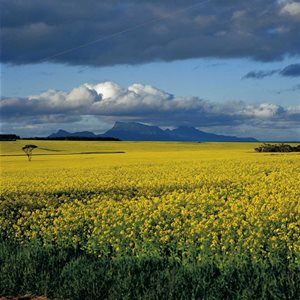 4,000 hectares of canola in South Australia’s Lower and Mid North regions have been affected so far, ABC Rural reports.
4,000 hectares of canola in South Australia’s Lower and Mid North regions have been affected so far, ABC Rural reports.The virus is transported by green peach aphids, which agronomists' say seem to have developed a resistance to insecticides since the state's last outbreak in 2007.
Agricultural consultant Mick Faulkner said they felt like they'd been "blind-sided" after not being able to work out what had been affecting crops.
“It took everyone a fair bit of time to realise that we weren't killing the aphids,” Faulkner said.
“And then to discover it was more than just feeding damage, something else was happening. Crops were really being belted.”
While the virus predominately affects canola it can spread to pulse crops like chickpeas and medic.
Faulkner said the virus-carrying aphids thrive in warmer weather and crops are more susceptible in their early stages.
He said once the virus gets into the paddock, there's not much farmers can do.
"Those that have been affected, I have grave fears that they won't yield anything at all.
He's urging farmers who haven't already been affected to remain vigilant and says while the aphids should have stalled for now, warmer weather in spring could see them spread further.





